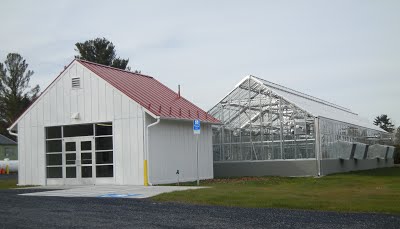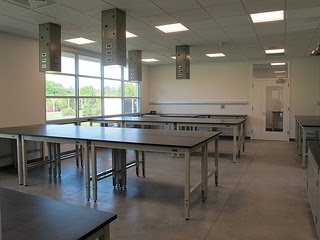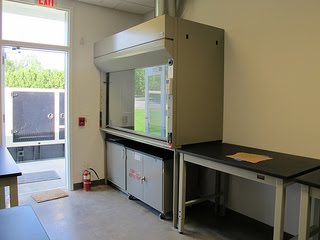Housing for Researchers
Blandy provides housing facilities to undergraduates, graduate students, and visiting senior researchers. Undergraduates are generally provided dorm style-housing. Seven dorm rooms are accompanied by a large self-serve kitchen, dining room, and laundry. Graduate students generally share a 5 bedroom farmhouse. In addition, we offer four two-bedroom cottages that provide more flexible living space suitable for senior researchers. The cottages each have their own kitchen and full bath. Blandy’s historic Stone Cottage (renovated in 2018) provides additional housing for visiting researchers. It has three bedrooms, a full kitchen, a dining room that also serves as a small meeting room, and high-speed internet.
Research Facilities
The construction of a modern greenhouse with four 500-square-foot growing rooms (bays) was completed in the fall of 2016. The partitioning of the greenhouse into four bays allows researchers to optimize climate conditions for their particular needs. Climate conditions are selected via a computer system that operates an automated heater, vents, fans, and shade curtains. The greenhouse also features a 500-square-foot headhouse for potting, cleaning, and storage.

In the spring of 2012, construction was completed on a 4,000-square-foot laboratory building. The building's design emphasizes open, flexible lab space and also features 2 assignable private labs and a conference room. The facility is equipped with dissecting and compound scopes, an environmental chamber, drying ovens, refrigerators, -20 C and -80 C freezers, a chemical fume hood, electronic analytic balances, and rooms with independent climate control. In addition, a Cahn electrobalance, leaf area meter, and a wide variety of live traps are available.


The Blandy library and dining room can be used for meetings and seminars.
Computer facilities include two networked desktop computers, a color laser printer, a large format printer, and wireless internet access.
Plant propagation facilities include 5500 square feet of greenhouse space, several lath houses, and a nursery area. Tools and equipment are available for plant care and establishing experimental gardens. There are two tractors, discs, a front-end loader, a tree spade, augers, a bush hog, three trucks, and a farm car. Two workshops are available for the fabrication of scientific equipment and supplies.
Blandy houses a branch of the University of Virginia library with over 3,000 volumes. Other library materials are readily available via interlibrary loan. Computer-assisted search services are also readily available.
Physical Accessibility and Barriers at Blandy Experimental Farm
The Blandy research community is committed to improving accessibility. Blandy is not barrier-free, but we strive to offer accommodation case-by-case whenever possible. Housing and research facilities at Blandy Experimental Farm range from historic (buildings built as early as the 1820s), to modern. As such, physical accessibility varies. Undergraduate dorm rooms require navigating stairs. Graduate student housing has first-floor options, but has other potential barriers. Three of our four Research Village Cottages are ADA-compliant, as are Blandy's laboratory and research greenhouse.
Many of the walking paths at Blandy are gravel. Footpaths are made with finer gravel, which improves the surface for wheelchairs and other mobility aids, but paths shared with vehicles use standard gravel and can present a barrier for some. Research projects may involve walking on uneven terrain to access field sites; all-terrain vehicles may be available for researchers on request. REU mentors will work with students during mentor matching and project planning when accommodation is needed.
If you have questions or concerns about accessibility at Blandy and your ability to live and perform research here, we welcome a conversation about potential accommodations we may be able to make. Please reach out to Maggie McCartney at sst9up@virginia.edu.
